ATI RN Pharmacology 2019 – Proctored Final Exam
Course
Art
Subject
Nursing
Category
Class Notes
Pages
24
Uploaded By
ATIPROS
A patient newly diagnosed with hypothyroidism is prescribed Levothyroxine (Synthroid) 0.25 mg PO daily. After 6 weeks of treatment the nurse determines that the medication was effective if the:
- Thyroid stimulating hormone (TSH) level is 2 microunits/mL
- Total T4 level is 2 mcg/dL
A nurse providing teaching to a client who has just been prescribed prazosin (Minipress). Which of the following client statements indicates understanding of the teaching:
- "I will not use a salt substitute while taking meds."
- "I will move slowly from sitting to standing to prevent falls."
A nurse is providing teaching to a patient who is prescribed phenytoin (Dilantin). Which statement by the patient indicates further teaching:
- "I should expect a rash to develop."
- "I may develop hair on my face or chest."
A nurse is receiving a telephone prescription for an antibiotic from a client's provider. Which of the following is the nurse required to do:
- Read the prescription back to the provider after transcribing.
- Write the trade name for the prescribed medicine.
A nurse is providing teaching to an adolescent and her family regarding a new prescription of phenytoin (Dilantin) for a newly diagnosed seizure disorder. Which of the following client statements indicates understanding of the teaching:
- "I will keep a seizure frequency chart."
- "I will skip a dose if I am experiencing nausea."
A nurse is caring for a client who has heart failure and is receiving furosemide (Lasix) and digoxin (Lanoxin). Routine laboratory results reveal a potassium level of 2.6 mEq/L. Which of the following actions should the nurse take first:
- Apply a cardiac monitor.
- Provide foods high in potassium.
A nurse administers ceftazidime (Fortaz) to a client who has a severe penicillin allergy. Which of the following client findings requires an incident report:
- The client is also taking lisinopril (Prinivil).
- The client reports shortness of breath.
A nurse is providing teaching to a female client who has been newly diagnosed with a seizure disorder and has begun phenytoin (Dilantin). The nurse should tell the client that phenytoin can decrease the effectiveness of which of the following:
- Ethinyl estradiol/desogestrel (Cyclessa)
- Fluoxetine (Prozac)
A nurse providing teaching to a client who is diagnosed with migraine headaches. The client is prescribed ergotamine (Ergostat) sublingual (SL). Which of the following should the nurse include in her instructions:
- "Take 1 SL tablet three times a day before meals."
- "Take 1 SL tablet at onset of migraine."
A nurse is reviewing a client's daily laboratory findings before administering 0.125 mg of digoxin (Lanoxin). The client's serum digoxin level is 0.7 ng/mL. Which of the following actions should the nurse take:
- Give the medication.
- Request a dose increase.
A nurse is planning to provide medication education for a client who will begin a course of therapy with metronidazole (Flagyl). Which of the following should the nurse instruct the client to avoid during the course of therapy:
- Coffee.
- Beer.
A nurse is teaching a client who has heart failure about a new prescription for captopril (Capoten). Which of the following statements by the client indicates a need for further teaching:
- "I will take the medication 1 hr before my meals."
- "I will use a salt substitute with my meals."
A client is experiencing acute angle closure glaucoma and IV mannitol (Osmitrol) 25% is prescribed. Which of the following client findings should the nurse recognize as being the best indication that the medication is achieving its therapeutic effect:
- Decrease in intraocular pressure.
- Lung sounds clear to auscultation.
A nurse is educating a client who has a new prescription for simvastatin (Zocor). Which of the following instructions should the nurse include in the teaching plan? (Select all that apply):
- Take the medication in the early morning.
- Do not take the medication with grapefruit juice.
- Minimize intake of alcoholic beverages.
- Expect therapy with this medication to be lifelong.
A client taking IV heparin and oral warfarin (Coumadin) for deep vein thrombosis. The client's aPTT is 4x the normal value and his INR is 2. Which of the following actions should the nurse plan to take:
- Decrease the heparin.
- Increase the warfarin.
The nurse is caring for a client who is in labor. The client is receiving oxytocin (Pitocin) by continuous IV infusion, piggybacked into a maintenance IV solution. The external FHR monitor indicates late decelerations. Which of the following actions should the nurse take first:
- Turn the client to a side-lying position.
- Discontinue the client's IV meds.
A nurse is providing teaching to a client taking bupropion (Zyban) as an aid to quit smoking. For which of the following side effects should the nurse assess the client:
- Insomnia.
- Tinnitus.
A nurse is teaching a client about the use of risedronate (Actonel) to treat osteoporosis. Which of the following client statements indicates a need for further teaching:
- "I need to sit up or stand after taking the risedronate."
- "I need to take the risedronate with food."
A nurse is caring for a client who is receiving haloperidol (Haldol). For which of the following adverse effects should the nurse be observing:
- Vomiting.
- Akathisia.
A nurse is caring for a client who is receiving oprelvekin (Interleukin II). Which of the following should the nurse document to indicate the effectiveness of the therapy:
- Increased platelet count.
- Increased RBC count.
A nurse is administering baclofen (Lioresal) for a client with a spinal cord injury. Which of the following should the nurse document as a therapeutic outcome:
- Increase in seizure threshold.
- Decrease in flexor and extensor spasticity.
A nurse is assessing a client who is receiving epoetin alfa (Procrit) to treat anemia. For which of the following should the nurse monitor related to this medication:
- Paresthesias.
- Increased BP.
A nurse is planning teaching for a client who has depression and is to start a new prescription for tranylcypromine (Parnate). Which of the following should be included in the teaching:
- Avoid eating citrus fruits while taking this medication.
- Move slowly when changing to a standing position.
A nurse is providing teaching for a new prescription: exenatide (Byetta) for Type 2 Diabetes. What should the nurse monitor and report:
- Abdominal pain.
- Increased thirst.
A nurse is reviewing lab results for a patient who has chronic asthma and is taking prednisone (Deltasone) every other day. Which of the following lab values should the nurse report to the doctor:
- Blood glucose 200 mg/dL.
- BUN 14 mg/dL.
A nurse is caring for a client receiving zidovudine (Retrovir). For which of the following lab results should the nurse prepare to monitor:
- Serum creatinine.
- Hemoglobin.
A client informs the nurse at the primary care provider's office that he received a prescription for timolol (Timoptic) to treat glaucoma. Which of the following in the client's history should concern the nurse:
- The client has a history of bradycardia.
- The client reports that he is taking loratadine (Claritin).
A mom of a newborn asks the nurse when her newborn should receive his first diphtheria, tetanus, and pertussis vaccine (DTaP). Which of the following should the nurse say:
- Birth.
- 2 months.
A nurse is preparing to administer warfarin (Coumadin) to a client diagnosed with atrial fibrillation. Which action should the nurse take before administering warfarin:
- Check INR results.
- Monitor the aPTT level.
A nurse caring for a client diagnosed with sickle cell anemia who is taking hydroxyurea (Droxia). Which findings should the nurse report? (Select all that apply):
- Hemoglobin 4.2 g/dL.
- Hematocrit 42%.
- RBC 4,700,000/mm3.
A nurse assesses a patient with chronic back pain who is receiving 650 mg acetaminophen (Tylenol) every 4 hours for pain. PCP has prescribed oxycodone/acetaminophen (Percocet) every 4 to 6 hours PRN for breakthrough pain. Which action should the nurse take:
- Place the client on seizure precautions.
- Notify the PCP.
A nurse is teaching a patient who has peptic ulcer disease and is to start a new prescription for sucralfate (Carafate):
Preview 5 out of 24 Pages
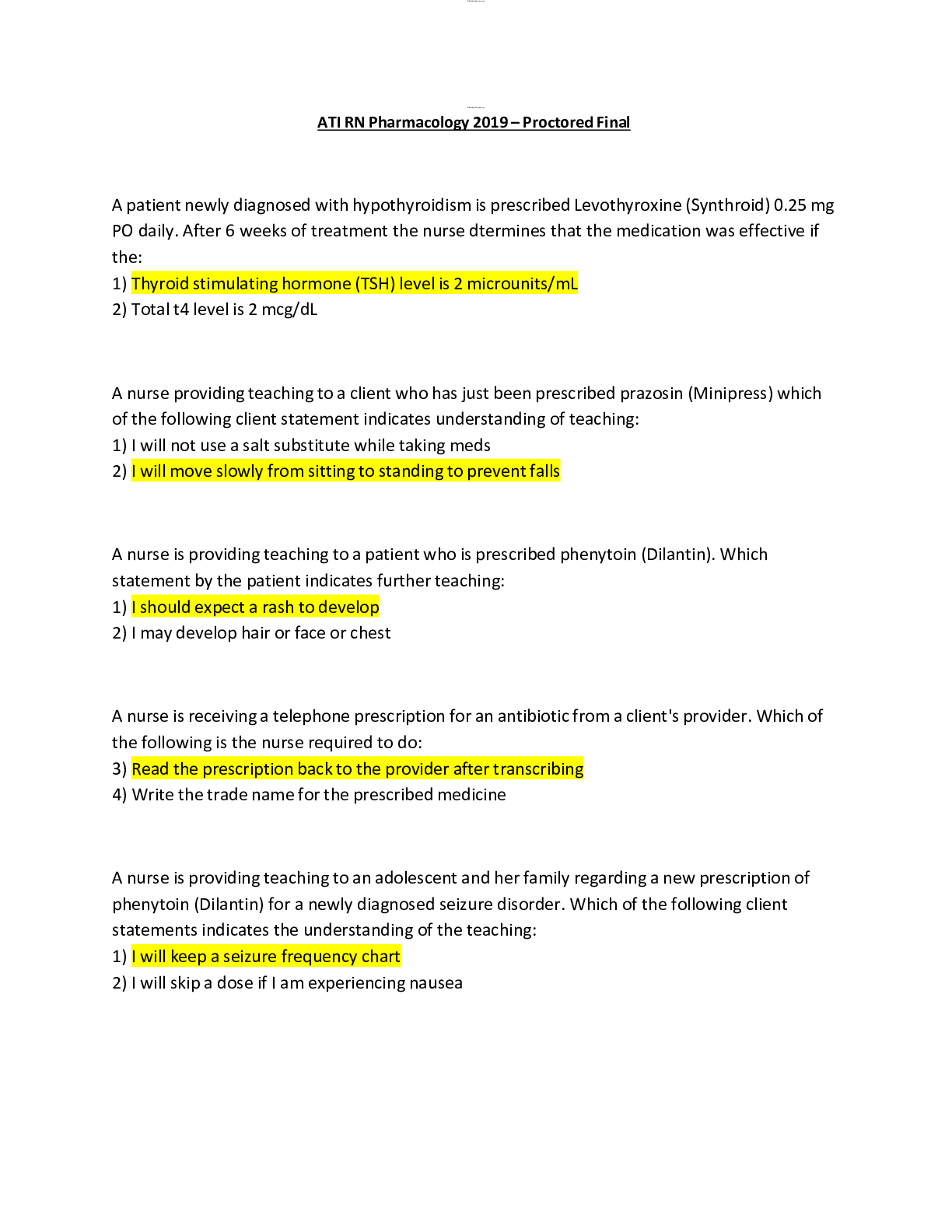
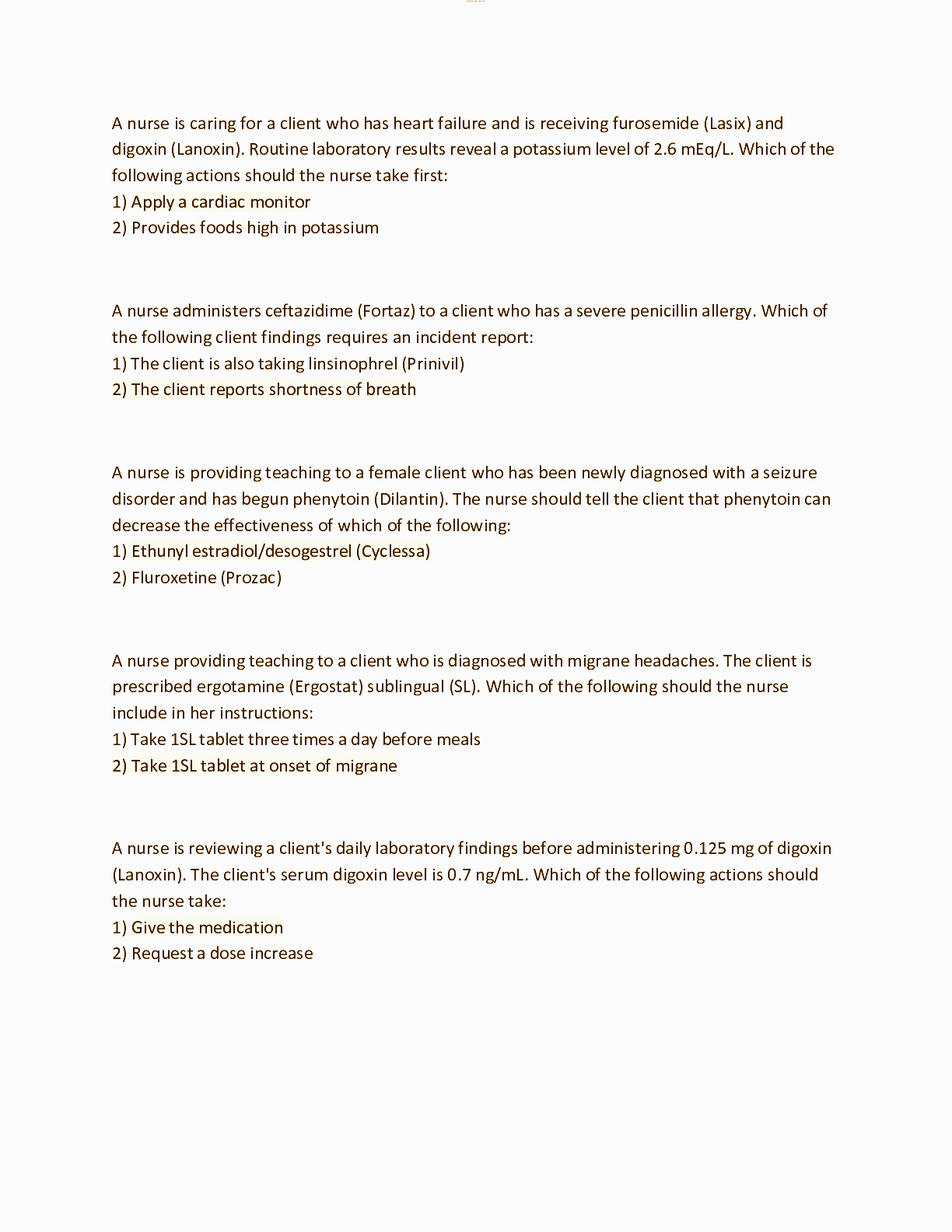
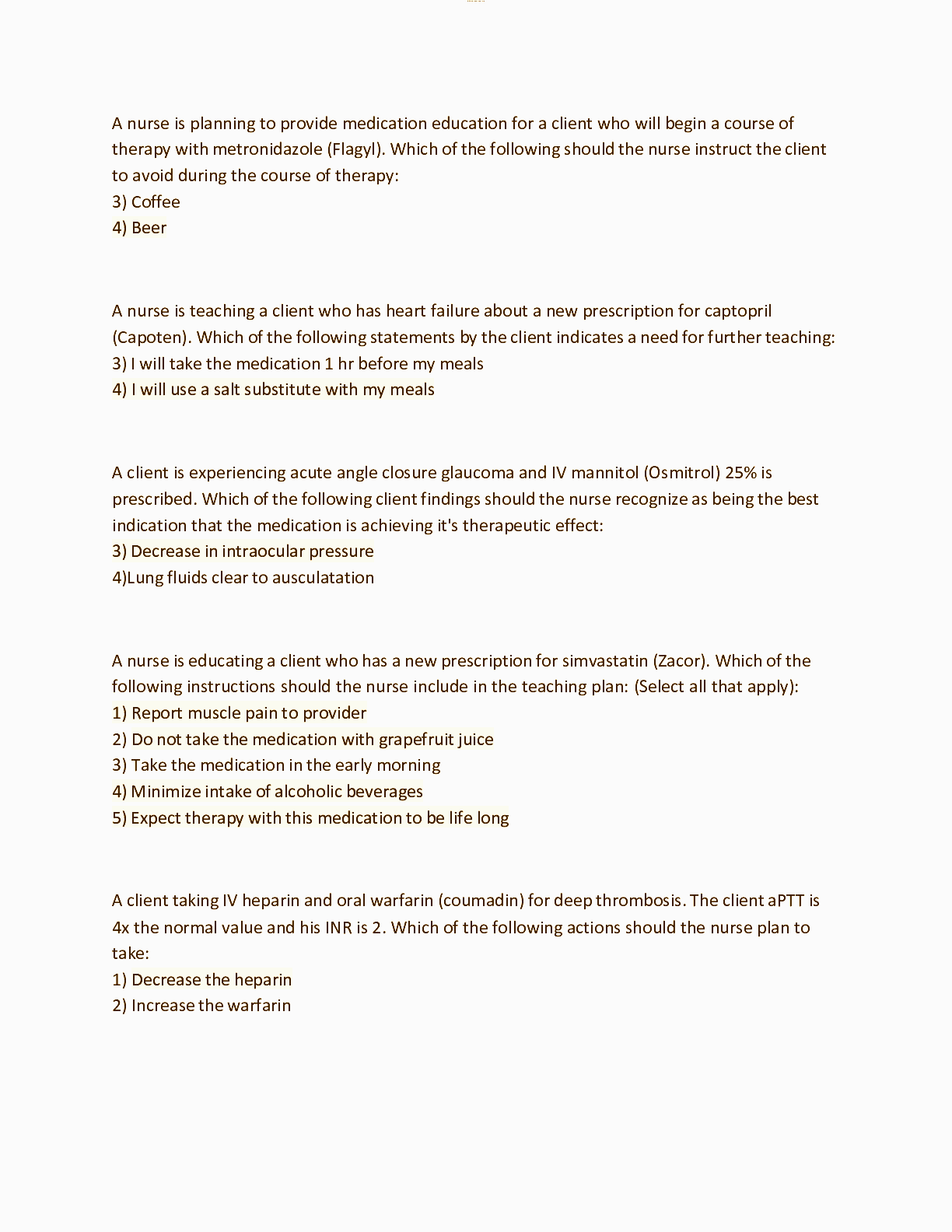
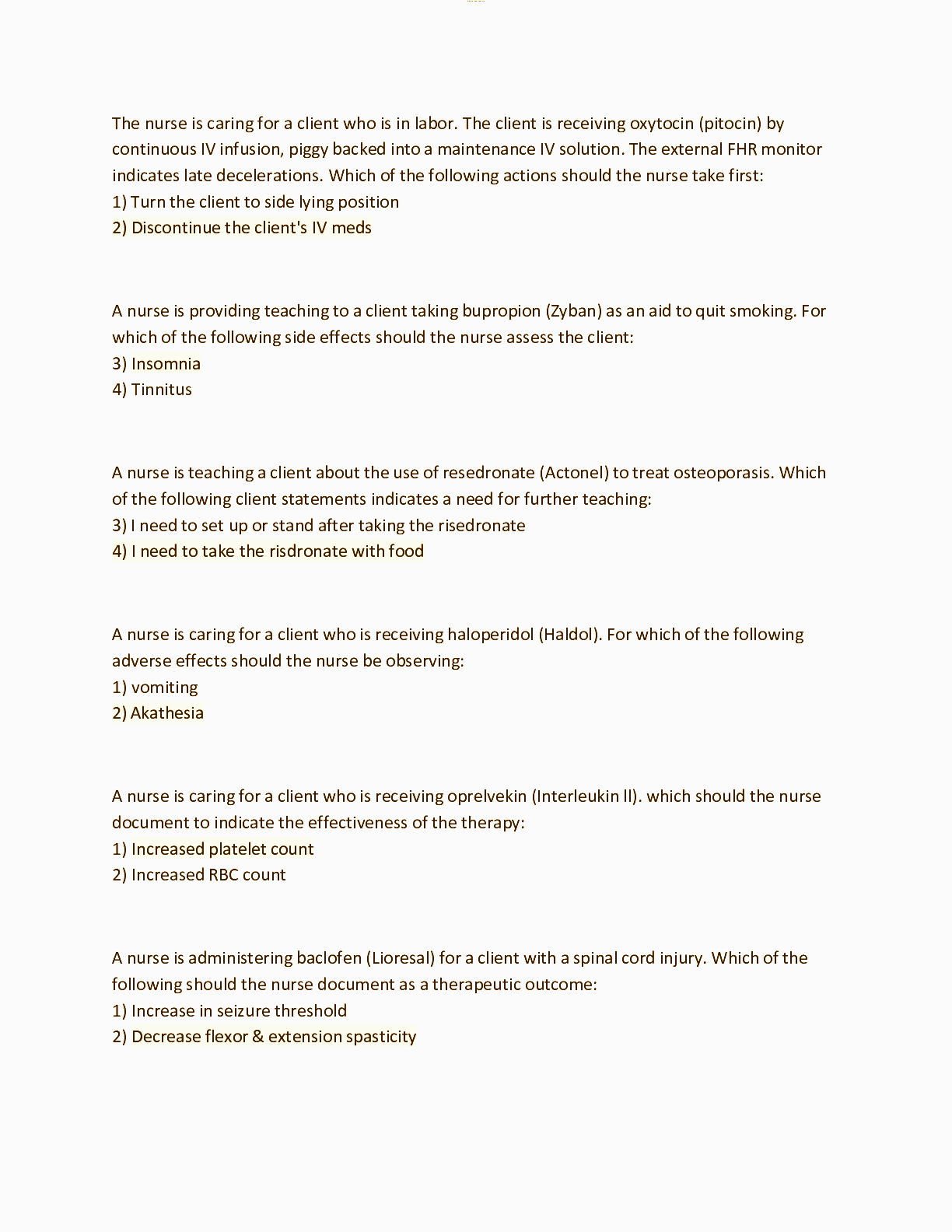
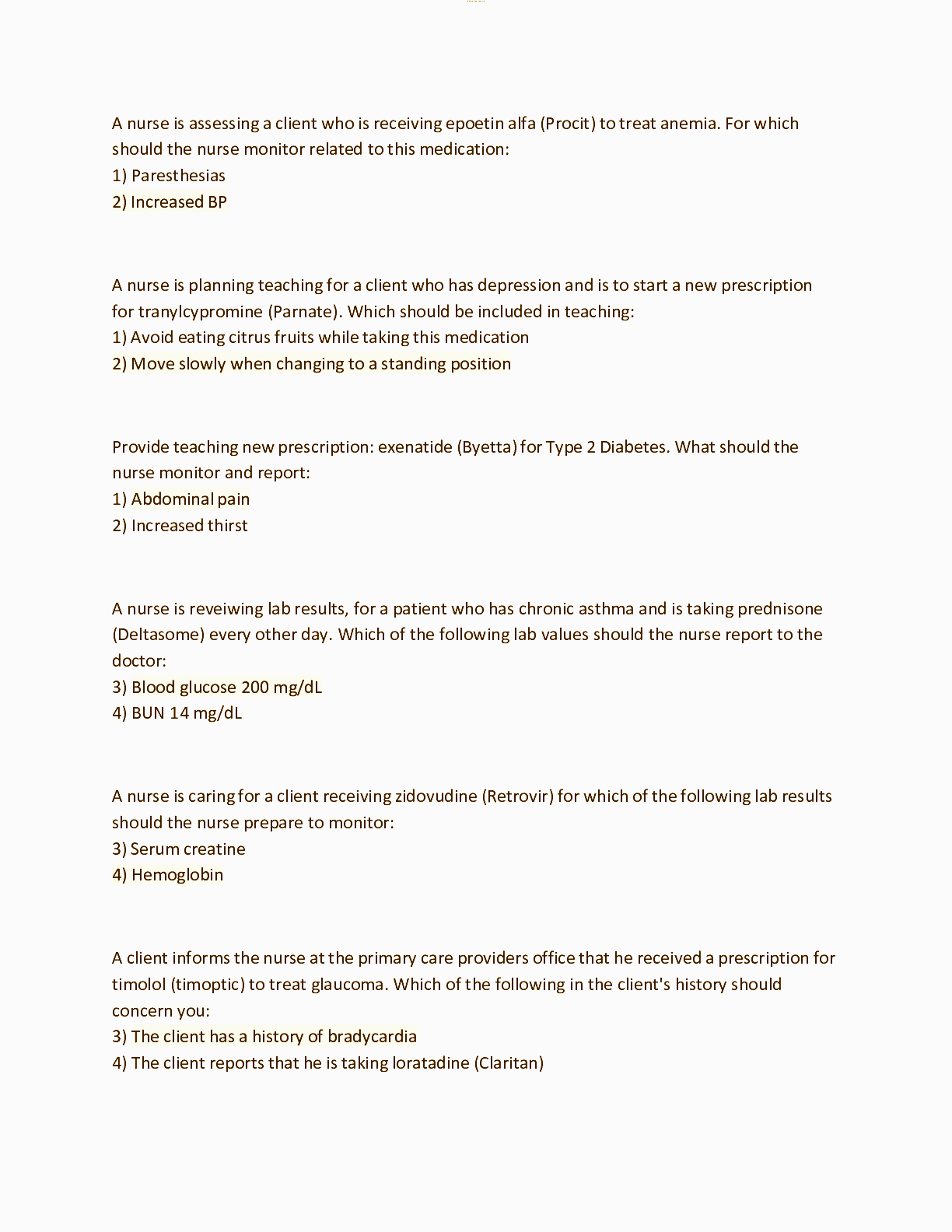
Download all 24 pages for $ 15.00
Reviews (0)
$15.00
